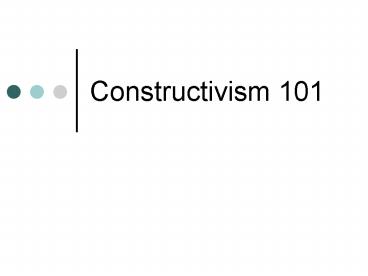Constructivism 101 - PowerPoint PPT Presentation
1 / 12
Title:
Constructivism 101
Description:
premise that, by reflecting on our experiences, we construct ... generates our own 'rules' and 'mental models,' which we. use to make sense of our experiences. ... – PowerPoint PPT presentation
Number of Views:54
Avg rating:3.0/5.0
Title: Constructivism 101
1
Constructivism 101
2
What is Constructivism?
- Constructivism is a philosophy of learning
founded on the - premise that, by reflecting on our experiences,
we construct - our own understanding of the world we live in.
Each of us - generates our own "rules" and "mental models,"
which we - use to make sense of our experiences. Learning,
therefore, - is simply the process of adjusting our mental
models to - accommodate new experiences.
- (Source http//www.funderstanding.com/constructiv
ism.cfm)
3
Principles of Constructivism
- Learning is a search for meaning
- Learning occurs in a context
- Instruction is tailored to learners mental
models - Constructing knowledge is purpose of learning
(not right vs. wrong)
4
Impact on Curriculum
- Less standardized curriculum
- Customized to connect to learners prior
knowledge - Emphasizes hands-on problem- solving
5
Impact on Instruction
- Teacher as facilitator/guide rather than
authority - Focus on making connections between facts
- Experimentation, open-ended questions, extensive
reflection, dialogue among students
6
Impact on Assessment
- Ongoing assessment during instruction
- De-emphasizes traditional grading methods
- Self-assessment, learner articulates growth
through projects and reflection
7
Constructivist Strategies
- Inquiry learning
- Discovery learning
- Situational learning
- Problem-based learning
- Cognitive Apprenticeship
8
Constructivist Words and Phrases
- Context
- Authentic
- Multiple perspectives
- Learner-centered
- Prior knowledge
- Higher-order thinking
- Meaningful connections
- Social negotiation
9
Discussion Question 1
- What constructivist strategies have you used in
your classroom?
10
Discussion Question 2
- Why is it difficult to be a constructivist in the
k-12 environment?
11
Discussion Question 3
- When might constructivism be the wrong approach?
12
How is the NC Quest Course Constructivist?
- Multiple delivery methods
- High degree of student ownership and
responsibility in the learning process - Consistent use of reflective practice
- Portfolio-based assessment































